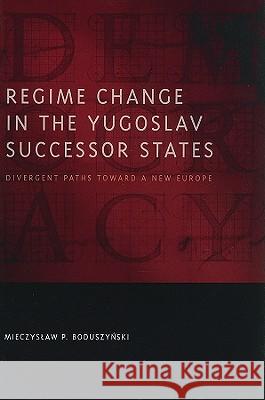Regime Change in the Yugoslav Successor States: Divergent Paths Toward a New Europe » książka
Regime Change in the Yugoslav Successor States: Divergent Paths Toward a New Europe
ISBN-13: 9780801894299 / Angielski / Twarda / 2010 / 360 str.
In the 1990s, amid political upheaval and civil war, the Socialist Federal Republic of Yugoslavia dissolved into five successor states. The subsequent independence of Montenegro and Kosovo brought the total number to seven. Balkan scholar and diplomat to the region Mieczys aw P. Boduszy ski examines four of those states--Croatia, Slovenia, Macedonia, and the Federal Republic of Yugoslavia--and traces their divergent paths toward democracy and Euro-Atlantic integration over the past two decades.Boduszy ski argues that regime change in the Yugoslav successor states was powerfully shaped by both internal and external forces: the economic conditions on the eve of independence and transition and the incentives offered by the European Union and other Western actors to encourage economic and political liberalization. He shows how these factors contributed to differing formulations of democracy in each state.The author engages with the vexing problems of creating and sustaining democracy when circumstances are not entirely supportive of the effort. He employs innovative concepts to measure the quality of and prospects for democracy in the Balkan region, arguing that procedural indicators of democratization do not adequately describe the stability of liberalism in post-communist states. This unique perspective on developments in the region provides relevant lessons for regime change in the larger post-communist world. Scholars, practitioners, and policymakers will find the book to be a compelling contribution to the study of comparative politics, democratization, and European integration."











